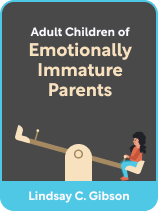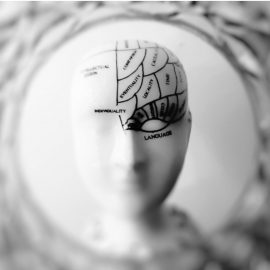

This article is an excerpt from the Shortform book guide to "Adult Children of Emotionally Immature Parents" by Lindsay C. Gibson. Shortform has the world's best summaries and analyses of books you should be reading.
Like this article? Sign up for a free trial here.
What are the signs of emotionally immature parents? What features do these parents share?
In Adult Children of Emotionally Immature Parents, Lindsey Gibson says that emotionally underdeveloped parents share a number of common features. Understanding what they are can help you determine if your parent was emotionally immature.
Let’s look at the signs of emotionally immature parents to be on the lookout for.
Feature 1: They’re Deeply Preoccupied With Themselves
Gibson says that one sign of emotionally immature parents is that they are highly self-centered, not necessarily because they’re narcissistic, but because they question their self-worth so deeply they’re unable to take other people into consideration. As a result, they’re unable to identify, relate to, or meaningfully acknowledge their child’s feelings, interests, and needs. Emotionally immature parents often:
- Rely on their child to meet and soothe their emotional needs. For example, they may complain and seek guidance from their child about their marital problems.
- Expect their child to intuit their feelings—then act out in emotionally volatile ways if the child doesn’t. For example, if the parent is unhappy, they may lash out or silently mope until the child feels as miserable as they do and figures out a way to solve their problem.
- Demand compliance and obedience from their child, requiring the child to do what they want, when they want, in the way they want. They may punish or shame the child for failing to behave in the manner they see fit.
(Shortform note: Gibson says that emotionally underdeveloped parents are deeply preoccupied with themselves due to their low self-worth, a description that overlaps with Robert Green’s categorization of deep narcissists In The Laws of Human Nature. Like emotionally immature parents, deep narcissists lack a self-image and demand that others fill their profound need for attention, become bored and impatient when you talk about things that don’t directly impact them, express righteous anger and act victimized when challenged or insulted, and need to control others.)
Impact on You
In response to your parent’s self-centeredness, you may:
- Have grown up believing that your feelings, interests, and needs were unimportant because your parent failed to meaningfully acknowledge them
- Have suppressed or turned anger toward your parent against yourself
- Feel that you have to engage with your parent entirely on their terms to have a relationship with them
Feel emotionally dependent on—not emotionally connected with—your parent because they always told you what to do
Feature 2: They’re Ruthlessly Self-Protective
Gibson argues that emotionally underdeveloped parents are notoriously defensive because they’re anxious, insecure, and fragile, terrified of being seen as bad, wrong, or unlovable. They’re often unable to tolerate criticism or engage in self-reflection. They also tend to be reactive, dismissive of others’ concerns, and unable to apologize.
When called out for behavior that’s insensitive to or hurts their child, they’re likely to say that wasn’t their intention and, as a result, they’re not responsible for the problem. They want instant forgiveness and acceptance and insist on moving forward from problems as if they don’t exist.
(Shortform note: Gibson argues that emotionally immature parents are self-protective because they’re scared of being viewed as bad or unlovable. Psychologists add another dimension to the picture, asserting that deeply defensive people view being held accountable for their behavior as a threat. When they enter self-protective mode, the part of the brain that processes emotions activates, sending them into a primitive, animalistic survival mode designed to keep them safe.)
Impact on You
You may have grown up believing that you were the source of, and solely responsible for fixing, problems in your relationship with your parent—even ones you didn’t cause. As an adult, you may have this same feeling in other relationships and have difficulty seeing or holding others responsible for their role in problems. You may take blame for things that aren’t your fault.
(Shortform note: Although it doesn’t come naturally to them, experts assert that people with a low sense of self-worth should hold others accountable for problems they cause. When you hold your significant other responsible for their actions you treat them as a full partner and adult. But when you shield them from blame, you fail to show them the respect they deserve as your equal.)
Feature 3: Their Emotions and Thinking are Restricted
Gibson states that emotionally immature parents often display a limited range of emotions and thinking that can hinder their ability to connect emotionally with their child. This is because their parents discouraged them from engaging with multiple emotions. As a result, they may show only one emotion at a time, they may only be interested in fact-based or intellectual conversations rather than emotional ones, and they may get agitated when their child doesn’t agree with them. These can discourage children from expressing their individuality.
(Shortform note: Gibson says that emotionally underdeveloped parents show a restricted range of feelings and thought, which can hinder their ability to connect emotionally with their children. Another limitation of emotionally unavailable adults is that they often choose to interact more with colleagues in professional settings than with family or friends, because they’re less likely to encounter emotional subjects in conversations with coworkers.)
Impact on You
You may have grown up feeling emotionally alone because your parent didn’t engage with you at an emotional level or on subjects you found interesting. As an adult, you may feel you have to agree with others about everything for them to like and value you.
(Shortform note: Emotionally immature parents’ need for their children to connect with them exclusively on their terms can inhibit children from going through the necessary process of “individuation.” Developing a sense of identity distinct from one’s parents allows children to cultivate a healthy sense of self and form healthy relationships with others. Children who don’t individuate can become overly reliant on others and feel confused about what goals to pursue and what they want from life. As a result, they may be riddled with self-doubt, anxiety, and depression.)

———End of Preview———
Like what you just read? Read the rest of the world's best book summary and analysis of Lindsay C. Gibson's "Adult Children of Emotionally Immature Parents" at Shortform.
Here's what you'll find in our full Adult Children of Emotionally Immature Parents summary:
- A look at the damage that emotionally neglectful parents can do to their children
- Strategies to help adults turn their relationship with their parent from toxic to tolerable
- Ways to heal and move forward from childhood emotional neglect







A good read and powerful insight into my aging reasoning.